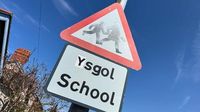In a bold move aimed at promoting the Welsh language, Gwynedd County Council has proposed plans to phase out English-medium education in the majority of secondary schools. This initiative is part of a broader strategy to enhance the use of Welsh in educational settings, reflecting a growing commitment to the language in a region where it has historically thrived.
The new draft policy from Cyngor Gwynedd mandates that students follow at least 70% of their curriculum in Welsh, up from the current requirement of a minimum of 60%. The council argues that this shift will help remove bilingualism and bilingual teaching, positioning Welsh as the principal language of education in the county.
"There have been linguistic changes in the county and the lives of young people are very different now compared to 1984," said Councillor Dewi Jones, Gwynedd's education portfolio holder. He emphasized that while English will continue to be taught, the emphasis is shifting towards a Welsh-medium education system.
Currently, all but two of Gwynedd's 13 secondary schools are designated as "Category 3" Welsh-medium, which requires them to offer at least 60% of school activities in Welsh. The two exceptions, Ysgol Friars in Bangor and Ysgol Uwchradd Tywyn, are in transition to becoming fully Welsh-medium and will not be immediately affected by the new policy.
Despite the council's intentions, the proposed changes have sparked significant backlash from the Welsh Conservatives. Party leader Darren Millar criticized the plans as "axing the opportunity for parents and pupils to choose to be educated in English," warning that such a policy could alienate those who prefer English-medium education.
In Gwynedd, a region where Welsh is spoken by a majority, the percentage of Welsh speakers has seen a decline. In 1981, 76.2% of the population could speak Welsh, but by 2021, that number had dropped to 64.4%. This decline has raised concerns about the future of the language, prompting the council to take action.
Public reactions to the proposals have been mixed. In Bangor, the county's only city, some residents expressed support for the initiative. Callum Marler, a local resident, stated, "It would be a good thing to be honest. I don't speak Welsh and I've lived here my whole life, I think it is a good idea." He acknowledged his past lack of interest in learning Welsh but recognized its importance as the language of the country.
Conversely, others, like Tony Walkden, voiced concerns about the loss of choice in education. "In education, I think it should be English. I agree that Welsh should be a strong language within this country," he remarked, emphasizing the need for parents to have the option of sending their children to English-medium schools.
Mared Rhys, a first-language Welsh speaker, welcomed the council's initiative, highlighting the importance of promoting Welsh and ensuring that children graduate with confidence in both Welsh and English. "It's important that the language is promoted and that children leave school confident in their Welsh and English. I think it's to be welcomed," she said.
Students also weighed in on the changes. Jade Lambsale, a student, noted the advantages of being bilingual, stating, "I guess having English as a second language is very useful. I grew up in Italy, so having two languages under your belt at such a young age is extremely useful to have." However, her friend Georgina Mee raised concerns about the practicalities of studying science subjects in Welsh, given the limited number of Welsh-speaking universities.
Despite the controversy, the council has assured residents that the draft measures will not result in immediate changes. The plans will undergo scrutiny and public consultation, allowing community members to voice their opinions and concerns. Councillor Jones reiterated that the current emphasis is on bilingual learning while transitioning towards a Welsh-medium education system.
The council has committed to ensuring that children and young people with additional learning needs receive equal linguistic opportunities in accordance with the new policy. In the primary sector, all pre-school and foundation phase education until the end of Year 2 will be conducted in Welsh. From Year 3 onwards, English will be introduced, but at least 80% of pupils' education will continue to be in Welsh.
As Gwynedd navigates these changes, the future of the Welsh language in education remains a topic of heated debate. While the council's intentions are rooted in preserving and promoting Welsh, the implications for English-medium education and parental choice are significant. The coming months will be crucial as the community engages with the proposed policy and its potential impact on the region's educational landscape.





